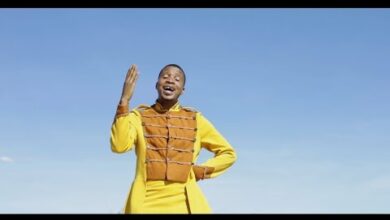
Freddie Harrel wants to restore Black women’s faith in synthetic wigs
When Freddie Harrel started her side hustle in 2017 – hair clip-in brand Big Hair Don’t Care – she did not foresee the journey of exploration that followed. Through pop-ups and her own social media, she began an international dialogue; finding “a community of misfits, shapeshifters, and avid self-explorers”, Black women unified by their collective disappointment in the Black hair industry.
As her understanding of the limitations of the scene grew, so too did the potential for her brand. Freddie kept constant conversation with tens of thousands of future customers via social media, helping to decide product styles, shapes and even the name. £1.5 million of investment later, RadSwan was born.
Freddie sees her new wig company RadSwan as an “ode to Black women” and indeed, her love and understanding of our needs is present. She describes being “grossed out” by Chris Rock’s 2009 documentary Good Hair and her fear of the unethical opacity of the human hair industry – this is why RadSwan only produces synthetic hair. For me, and many others, the sheer mention of synthetic wigs invokes traumatic memories of static weaves for Year 11 prom or certain church aunties, but Freddie wishes to dignify the experience.
Ethically, she argues, we deserve better, but quality-wise, we deserve better too.
“I’m tired of always trying to explain why I switch hairstyle or claim it as protective styling – we shouldn’t have to justify it”
Freddie Harrel
Radswan offers a capsule collection of three units, and they are beautiful; intricately made with a range of curl patterns that reflect Afro hair. They are numbered 1,2,3 rather than a geographical name so as to not attach any identity to the wigs – Black women control the narrative and she wishes to celebrate that.
Sitting down with Freddie over zoom, we giggled as we discussed early memories of our hair, whether there is room for eco-consciousness in the Black hair industry and running a new business during a pandemic.
gal-dem: How did you get into the Black hair industry?
Freddie Harell: I used to use human hair extensions but they were so expensive and difficult to manage. In order to get them to look like our texture, it was even more work and would get matted easily.
Then I watched Good Hair and was completely turned off using human hair, but no other option existed that wasn’t shiny, flimsy and smelly. But one day, I found a supplier on a hair forum. I sent her photos and I was like “can you do that in synthetic for me? I want it!”. And she did – but it was just for me. Then in 2016, my husband got offered a job out of the blue in Geneva and I needed a side hustle quick. Then it came to me! The hair!
Is there room for eco-consciousness in the Black haircare market? What do you say to those of us hesitant to make the move to synthetic hair brands?
It’s hard because hair is such a strong means of self-expression for us from a very young age. As immigrants and minorities, we are always told: roll with the punches, keep your head down, blend in – but actually, through our hair, we just get this unique tool that all of us use in our own way, right? So when it comes to what sort of hair people should wear, it is so deeply personal. But human hair by its very nature is not sustainable. There are so many questions as there are no standards in place. Whose hair is this? How many heads? How was it sourced? I do think that, as more and more white women are wearing human hair extensions, this will lead to further regulation of the market… but until then?
“Artificial hair has such a negative stigma surrounding it for young Black women”
Freddie Harrel
Through RadSwan, I wish to upgrade and dignify the whole synthetic hair experience. Artificial hair has such a negative stigma surrounding it for young Black women, not so much for white women. Why is this? I just feel like if we didn’t have to buy it where we are not treated well, if we didn’t have this product that looks so shiny and fake, then there wouldn’t be all of this stigma around it.
You describe RadSwan as an ode to Black women, could you expand on this?
It’s definitely an ode to Black women. Can we have this conversation about how we’ve always changed hair? Why is it that once we are in our 20s and 30s, all of a sudden, you loving yourself means that you have to just wear the same hair? This versatility is part of us, like being shapeshifters is part of our making. I’m tired of always trying to explain why I switch hairstyle or claim it as protective styling – we shouldn’t have to justify it, we should just be able to do it. This is the reason why our shapes don’t have names, it plays into the idea that you’re trying to be someone else. No, you’re the shapeshifter, you’re the artist, you’re the muse. We are those fluid beings that are constantly expressing ourselves.
I’ve upgraded the quality for us. From even the way our website is built, we want to dignify the experience with Black women at the centre. We made the RadGrip which is a mixture of skin-like fabric and velvet, an accessory to put underneath your wig to stop it from making it look so… wiggish. At the moment, so much of the wig industry is based on the assumption that we can do hair – when 80% are learning from YouTube. So our products are made with the novice in mind whilst not compromising on the premium experience.
How important is it to you that Black women take leadership in the Black hair game?
At the moment the economics of this market is huge volume and low margin. We are the first to introduce premium and then there’s still so much that we can do. I would love to see Africa more involved in the production for instance. That’s definitely the long term plan with RadSwan – to own more of the supply chain and make sure that more Black people make money from it.
How has it been navigating setting up a new business in a pandemic? What’s kept you motivated?
It’s been full of lessons, a lot of setbacks, a lot of disappointments, a lot of tears – many moments of despair. But I feel like the lessons that I’ve learned in such a short time were necessary. I think when you’re the founder of a brand, it’s not like you apply to a job – you have to design your own role. Then all the baggage that we come with, the insecurities and expectations when you’re a woman; when you’re a Black woman. It’s definitely been a personal journey, as much as it has been a professional journey. I’ve journaled so much and I’ve been meditating – really indulging into my relationship with myself and my own spirituality. It’s what keeps me going.












































